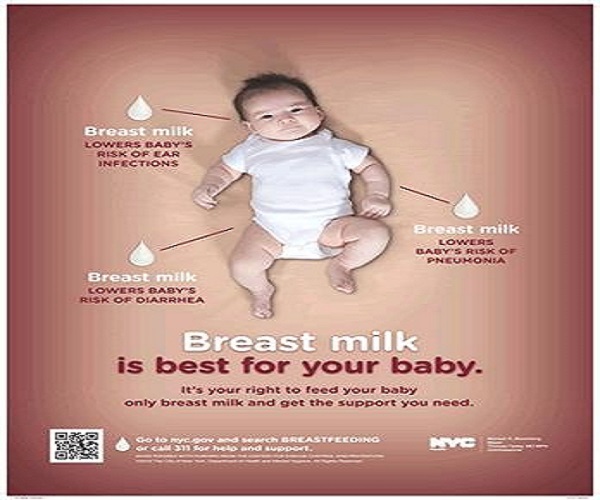Why breastfeed ?
An infant who steps into this world from the secure confines of his mother’s womb is extremely delicate and fragile. To sustain themselves in this new, alien environment, they need something which not only provides them with the necessary sustenance but also protects them from a host of infections. And what could be better than breast milk which is packed with all the necessary nutrients and vitamins necessary for the growth and development of a child. Infant milk formula is but a patch on natural breast milk which contains a surprising array of nutrients.
Benefits of breastfeeding for child
Breast feeding offers numerous health benefits to an infant which simply cannot be matched by formula milk. The first milk which comes out of a mother’s breast post-delivery is called colostrum. This thick yellow fluid is packed with important antibodies which protect your child from numerous diseases. Moreover, it acts as a laxative helping the baby’s body remove meconium, the dark greenish stool. Presence of meconium in the body leads to jaundice, so the sooner it is removed from the body the better it is. Gradually this colostrum thins out and what you get is breast milk which though thinner in nature contains all the proteins and antibodies intact.
Increases immunity

The ingredients contained in breast milk boosts your baby’s immune system by increasing the amount of antibodies, white blood cells and enzymes which protect your child from a host of diseases while he is breastfeeding and also when he has been weaned. A child exclusively fed on breast milk in the beginning years of his life develops a strong immunity which protects him/her from many diseases.
Protection from various diseases

Children who breastfeed are less likely to suffer from type 1 and 2 diabetes in later life. Research also suggests that breastfed children have lesser chances of contracting childhood leukemia, asthma, obesity etc. Breastfed infants are less prone to allergies in comparison to formula-fed children and they also get protection from eczema and wheezing.
Maintains digestive health
Our digestive tract is home to both good bacteria and bad bacteria. The good bacteria are called probiotics which are essential for maintaining our digestive health. When a mother breast-feeds, the probiotics in her body are passed on to the child. These probiotics make an enabling atmosphere for healthy bacteria to grow in the gut of the breast-fed child and prevent E coli from taking root in the intestine which are the cause of many intestinal diseases.
It is easier to digest

An infant’s digestive system is not well developed. The proteins in breast milk place less strain on the digestive system and are thus easier to digest as compared to the proteins found in cow’s milk. Moreover, whatever protein breast milk contains is passed on to the child while in case of formula milk, about half the proteins is excreted by the baby’s body. Thus the baby stands to benefit more from breast milk than formula milk.
Breastfeeding might protect your child from becoming obese
Doctors recommend breastfeeding as a means for you to reduce the chances of your child becoming obese. Breast milk contains leptin, a hormone which is good at regulating fat and appetite. It is also seen that breast fed children learn to curb their appetite better than bottle fed children. In contrast, formula milk stimulates the body to produce insulin which leads to increase in body fat. As compared to breastfed children, formula fed children gain weight easily which gets reflected later on in the form of obesity.
Benefits of breastfeeding for mother
Now that you have known about the benefits of breastfeeding your child, its time you learnt about the benefits accrued to mothers who breastfeed. A look at some of the benefits offered by breastfeeding will have many expectant mothers going for this option.
Reduces the risk of breast cancer and ovarian cancer
Women who breastfeed their child are less likely to suffer from breast cancer, reducing it by as much as 25%. Increased estrogen production is linked to greater chances of contracting cancer. During breastfeeding, less estrogen is produced, thus the longer the duration for which a mother breastfeeds her child, the lesser the chances she has of developing breast cancer. Regular periodic ovulation exposes one to higher levels of estrogen increasing the chances of cancer. During breastfeeding, a woman doesn’t ovulate generally, so she is better protected against cancer.
Protects from osteoporosis

Women who do not breastfeed their child have greater chances of suffering from osteoporosis in later life than women who breastfeed. It is true that mineral bone density decreases during breastfeeding as the body uses the calcium form bones to produce milk but strangely the mineral content is restored post breastfeeding, providing these women a strong weapon against osteoporosis.
Contributes to emotional health

When a mother breastfeeds, the maternal instinct increases manifold and leads to greater bonding between the mother and the child. This leads to the development of a strong emotional bond between the two which lasts a lifetime. Breastfeeding women suffer less from postpartum depression and are less prone to anxiety and mood swings. It’s because when a woman breastfeeds, her body releases a hormone called oxytocin which promotes a sense of well-being among mothers.
Helps in child spacing
Breastfeeding delays the ovulation process, thus it acts as a natural contraceptive helping women to space the gap between children. Prolactin, the hormone which produces milk performs an additional function of suppressing the follicle stimulating hormone which makes the uterus ready for matured eggs. Therefore, as long as you breastfeed there are fewer chances of you becoming pregnant again.
Aids in losing postpartum weight
To manufacture milk, the body expends about 200 to 500 calories daily. This is equivalent to cycling for 1 hour. Breastfeeding thus offers a natural way to reduce all those additional weight gained during pregnancy. Breastfeeding mothers tend to return to their original figure earlier than women who do not breastfeed. It has been seen that there is considerable shrinkage in the hip area of breast feeding women as compared to those who do not breastfeed.
Very convenient
The ease with which breast milk can be given makes it the natural choice for mothers on the go. Even when you are traveling you don’t have to worry as it’s completely hassle-free. Imagine the number of things you have to carry if you are formula feeding a baby. Also, who can forget the late night trips to the kitchen to prepare milk for a crying baby? How about feeding a baby without getting up from the bed. Seriously, what could be more convenient than this?
Extended breastfeeding
Some mothers opt to breastfeed their child even after their first year. This is called extended breastfeeding. No doubt, a toddler at 1 year receives nutrients from the variety of food that he eats, yet there is no denying the fact that breast milk contains an abundance of nutrients which benefit the child even after he has crossed the 1 yr. benchmark. A child on extended breastfeeding is less prone to illness as compared to his non breast-fed counterparts.
Benefits of extended breastfeeding
- Children who were breastfed for an extended period develop stronger immunity against illnesses and also remain protected from various diseases such as diabetes and heart disease. The immune system of a 1 year child functions at only 60% of an adult’s immune system. Thus toddlers need additional support and what better than breast milk which is rich in antibodies. Formula milk has no live antibodies, so there is always the threat of a child developing infections as opposed to mother’s milk which contains immune-globin’s that prevent germs from playing havoc in the child’s body.
- Mother’s milk contains DHA, a fatty acid which is very important for proper mental development of an individual. It improves eyesight and is also used to treat serious illnesses such as heart problems, asthma, cancer, kidney problems etc. Children on extended breastfeeding continue to benefit from natural doses of DHA thus fortifying themselves against a list of diseases.
- Breastfeeding helps maintain the proper teeth alignment of children. Infants and toddlers have a natural tendency to suck on something. Leave them alone for a moment and you would invariably find them sucking on something be it their pacifier or their thumb. Sucking on such foreign objects destroys the natural alignment of teeth. On the contrary, suckling the breast can actually ensure that your infant’s teeth remain properly aligned. They also reduce the dependency on external objects thereby minimizing the chances of infections.
No matter for how many days you choose to breast feed your child, both you and your child are going to benefit enormously. The long term benefits of breastfeeding are endless. It’s therefore in the interest of both you and your child that you give breastfeeding a shot and continue with the process as long as you are comfortable with it.